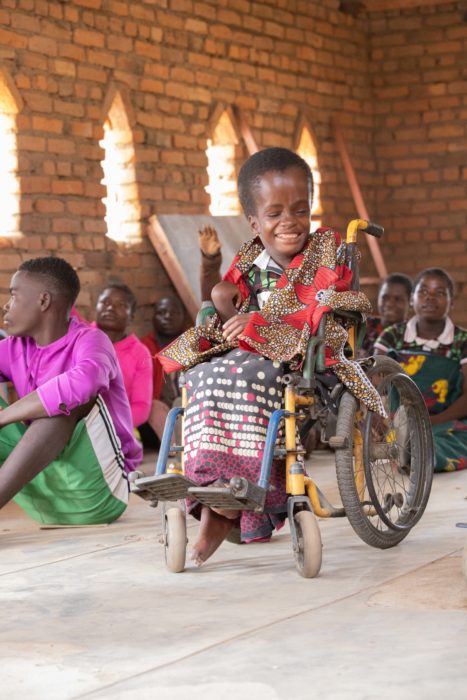4th December 2023
Disability Inclusive Education: our commitment to supporting children with disabilities to achieve SDG 4

This year’s theme for International Day of Persons with Disabilities is ‘United in action to rescue and achieve the Sustainable Development Goals (SDGs) for, with and by persons with disabilities’.
This feels particularly poignant when we look at education. Children with disabilities are the single most marginalised group of children; the least likely to be in school and learning. They are the last to enter school and more likely to leave before completing primary or secondary education, facing complex challenges. These include negative attitudes and social norms, physically inaccessible schools, low access to assistive devices, and low-quality teaching that does not meet their needs.
For girls with disabilities these challenges are intensified by additional gender-related barriers, including higher risks of sexual violence or preferences from parents to educate boys. So, girls with disabilities really are among the most marginalised children in the world.
13-year-old Chikondi, from Dedza, Malawi, was one of these girls. Chikondi is deaf, uses a wheelchair, and has mild learning difficulties. She had never attended school until she received support from the UK’s Girls’ Education Challenge (GEC) programme.
Chikondi was identified as a potential participant for the GEC TEAM Girl Malawi Project, led by Link Education International. The project focused on targeting out-of-school children who had either dropped out or never attended school. 12% of the over 6,000 beneficiaries in this project were children with disabilities.
An Individual Education Plan was developed in the programme for Chikondi to support tailored teaching meeting her needs. This meant that Chikondi was able to attend lessons with her classmates covering core literacy and numeracy. In addition, Chikondi was able to develop resilience and self-esteem, and made new friends. Now that TEAM Girl Malawi has finished, Chikondi is being supported to continue her education at a school for deaf children.

We cannot achieve SDG 4 (quality education for all) without specific action to support children with disabilities. This is not just the right thing to do but will also lead to these children leading productive lives with choices and opportunities. We have made some good progress, and Chikondi is one of over 150,000 marginalised girls with disabilities supported by the GEC. We did this through the provision of assistive devices, work to address stigma and harmful attitudes at the community and school levels, and by enhancing foundational learning outcomes so that more girls with disabilities could transition to secondary school.
But there is much more to do. I am delighted that to mark this year’s International Day of Persons with Disabilities, the Foreign, Commonwealth and Development Office (FCDO) has endorsed the Call to Action on Disability Inclusive Education (PDF, 2MB). The Call to Action, which was launched at last year’s Transforming Education Summit, commits us to:
- progressively increase budgetary allocations for disability-inclusive education towards at least 5% of education budgets by 2030
- set a medium- to long-term target to ensure all learners with disabilities are reached in all education programmes, recognising that at least 10% of learners in any country will have a disability
- ensure that all education programmes and grants mainstream disability and include disability inclusion criteria and targets
These are ambitious commitments. But they are no more than children with disabilities deserve, and it is clear that dedicated action to support these children is required as we approach the 2030 deadline for achieving the SDGs. Whilst the FCDO is the first donor to endorse the Call to Action, my hope is that the global community will come together and work in partnership with partner countries, civil society, and local organisations to achieve our shared goal.
Quality education for all really does mean quality education for all.